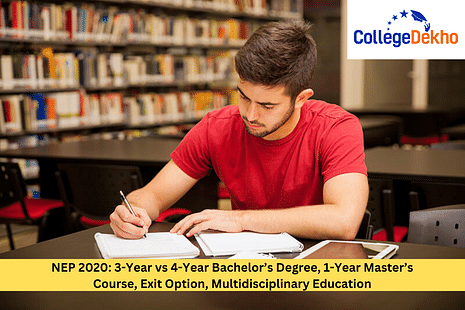NEP 2020 is set to bring drastic changes in the higher education system of India. Through NEP, students can enjoy flexible education options such as a 3-Year vs 4-Year Bachelor’s Degree, 1-year Master’s Course, Exit Option and Multidisciplinary Education.

The Ministry of Human Resource Development (Ministry of Education) has formulated the New Education Policy (NEP) 2020, in the hope of bringing radical changes to the country's education system. The Indian education system is going to be updated after 34 years. In higher education, there will be several changes such as subject combinations, flexible degree options, unique exit options for various courses, etc. While the NEP 2020 did not make four-year degree courses compulsory, these courses will be preferable options for students who wish to earn a degree in ‘Research’. This article explains everything about 4-year bachelor’s degree courses, master’s courses, flexible exit options and multidisciplinary education.
NEP 2020 is expected to create a multidisciplinary education that aims to develop the social, physical, intellectual, emotional, and moral capabilities of human beings in an integrated manner. It also suggests the improvement of all aspects of the education format, including the school regulation and governance, to create a new system which is aligned with the aspirational objectives of 21st-century education along with India’s tradition, culture and value system.
With an adjustable curriculum, it is easy to promote creative combinations of various disciplines. Candidates will be able to choose from languages and at the same time fields such as Applied Sciences, Mathematics, and Business Studies. This new approach aims at developing critical thinking, versatility, adaptability, problem-solving, flexibility, analytical and communication skills in the learners. The opportunities for doing research are enhanced and improved through a holistic and multidisciplinary approach. Let’s get to know more about NEP 2020, 3-year vs 4-year bachelor’s degree, 1-year master’s course, exit option and multidisciplinary education from this article.
Goals of NEP 2020
The National Education Policy 2020 is a detailed scheme that aims to bring meaningful changes to the Indian education system over time. These changes are expected to improve the quality of education as well as other aspects of the education system holistically. However, to understand how the NEP 2020 will bring about these changes, first, we must take a look at the principles and goals of NEP 2020 mentioned below:
Recognising the Uniqueness of Every Student: One of the primary goals of NEP 2020 is to foster, identify, and enhance each student’s exceptional capabilities and help them thoroughly understand the same. The aim is to make teachers and parents understand and promote each student’s academic and non-academic development.
Promotion of Foundational Literacy: A very high-priority goal of the NEP 2020 is to assure that every student has strong foundational literacy and numeracy skills by Grade 3 of their education.
Enhancing Educational Flexibility: The changes brought about by this policy will encourage learners to choose their learning rotations and thereby choose their paths in life according to their talents and interests without being limited to their academic background.
Bridging the Gap Between Disciplines: As we know in the Indian education system, there is a huge gap between disciplines like Arts, Science, and Commerce. NEP 2020 aims to eliminate these hard separations to avoid harmful hierarchies in education.
Holistic Development Through Education: Students will receive multidisciplinary and holistic education in their developmental years to confirm the unity and integrity of all knowledge.
Emphasis on Conceptual Learning, Critical Thinking & Creativity: Students will be motivated to develop their critical thinking and creative abilities through the curriculum, which will ensure conceptual learning and retention of knowledge.
Promotion of Ethical & Human Values: Along with pure academic development, values like empathy, respect for others, cleanliness, democratic spirit, scientific temper, responsibility, equality, and justice will be the focus of foundational education.
Promotion of Multilingualism: More emphasis and recognition will be given to different languages to ensure the cultural significance of these languages is preserved.
Promotion of Life Skills: In addition to academic excellence, communication skills, teamwork, and interpersonal skills will also be developed.
Focus on Formative Assessments: A shift from summative assessment to formative types of assessment will be encouraged to promote the current educational culture.
Extensive Use of Technology: The use of technology in teaching and learning, and removing language barriers will be promoted across educational sectors and areas.
Consistency in Curriculum: The curriculum across different levels of education, from early childhood care to higher education will have progressive growth and there will be synergy in the curriculums.
Enhancement of Teaching Staff & Faculty: Enhancement of academic structure will be complemented by enhancement of teaching faculty through their recruitment, continuous professional development, positive working environments, and service conditions.
Simple & Strict Regulatory Framework: A light but tight regulatory framework consisting of adults and reviews to ensure integrity, transparency, and resource efficiency of the educational system will be included.
NEP 2020: Holistic and Multidisciplinary Education
According to NEP 2020, certain aspects of traditional education must be brought back because of their relevancy in 21st-century education. Long ago, universities such as Takshashila and Nalanda played a vital role in promoting holistic and multidisciplinary education. The education is a combination of knowledge of 64 arts.
64 Arts :
According to NEP 2020, the 64 arts not only include subjects such as singing and painting but –
Scientific Fields such as Mathematics and Chemistry |
|---|
Vocational Fields such as Carpentry and Clothes-Making |
Professional Fields such as Engineering and Medicine |
Soft Skills such as Communication, Discussion, and Debate |
All the above subjects have an Indian origin and the same shall be considered as ‘Arts’. In today's time, the combination of these Arts is termed as Liberal Arts, which means a liberal notion of arts.
Integrating Arts with STEM
NEP 2020 strives for the assessments of educational approaches in UG education where the Arts stream shall be integrated with STEM (Science, Technology, Engineering, and Mathematics). Such practice has always been successful and improves creativity and innovation, problem-solving abilities, higher-order thinking skills, communication skills, teamwork, social and moral awareness and in-depth learning.
Imaginative and Flexible Curricular Structure
NEP aims to promote an imaginative and flexible curricular structure that will enable creative combinations of disciplines of study. Through this method, students will have no restrictions on entry and exit options. The universities and colleges will introduce interesting course options to students apart from mandatory specialization in a subject. Through this method, the institutes will have autonomy in framing curricula.
The flexible and innovative curricula of Higher Education Institutes include –
Credit-Based Courses | Projects in the Areas of Community Engagement & Service |
|---|---|
Environmental Education | Value-Based Education |
New Departments to be Established in HEIs:
The Higher Education Institutes (HEIs) will be given the flexibility to set up separate departments in –
Languages | Literature |
|---|---|
Philosophy | Music |
Indology | Art |
Dance | Theatre |
Mathematics | Education |
Statistics | Pure & Applied Sciences |
Sociology | Economics |
Sports | Translation |
The institutes can award credits to these subjects in the Bachelor’s degree programmes. The institutes can also offer courses under these departments in ODL (Open & Distance Learning) mode.
Internships & Research Internships
As a part of holistic education, students pursuing various courses at HEIs will be provided internship opportunities in local business/ industry, artists, craft persons etc. Students will also have an option to take up research internships with faculty and researchers of the respective HEI. This activity will not only improve students’ practical side of learning but also improve their employability.
NEP 2020: 3 Year-vs 4-Year Bachelor’s Degree
According to NEP 2020, the structure and length of degree programmes shall be adjusted to promote holistic and multidisciplinary education. The detailed comparison of three-year vs four-year Bachelor’s degree can be checked below.
Aspect | Before NEP 2020 (3-Year Degree) | 3-Year Degree (After NEP 2020) | 4-Year Degree (After NEP 2020) |
|---|---|---|---|
Exit Option | Not Available (Available only for five-year Integrated Courses) | Available after 1 st year, Second-Year | Available after 1 st , 2 nd and 3 rd year |
Award of Degree | Mandatory to complete the full duration of the programme |
|
|
Scope of Research | Minimal | Candidates who do not wish to continue with 4 th year will have to complete the research project in the 2 nd -year of Master’s programme (applicable only for those students who opt for Master’s). | Candidates who complete 4-year degree courses will also get ‘Degree with Research’ if he/ she completes rigorous research specified by the Higher Education institute. |
Also Read: IGNOU PhD Admission 2024
NEP 2020: Revised Structure for Master’s Course
The NEP 2020 will also revise the structure for the Master’s course. The details with regard to the same can be checked below –
Type of Course | Eligibility | Course Details |
|---|---|---|
Type 1 – 2-Year Master’s Course | Candidates who have completed a three-year Bachelor’s degree are eligible | The second year of the course will be devoted to the research project and it is mandatory to complete the same. |
Type 2 – 1-Year Master’s Degree Course | Candidates who have completed 4-year Bachelor’s degree programme with Research | Research is not mandatory for a 1-year course, as students already complete their research project in a four-year Bachelor’s degree. |
Type 3 – 5-Year Integrated Bachelor’s/Master’s Programme | To be Updated. | To be Updated |
Revised Eligibility Criteria for Ph.D
Students aspiring to study PhD have to follow different eligibility conditions. NEP 2020 has revised the eligibility criteria for PhD courses. Candidates who have completed their 4-year bachelor’s degree course with at least 75% marks or equivalent can apply for a PhD. On the other hand, students who have completed their 4-year bachelor’s degree and one-year master’s course can also apply for a PhD. However, aspirants who have completed a traditional 3-year bachelor’s degree must complete a 2-year master’s degree programme with at least 55% marks or its equivalent grade to be eligible.
Currently, several universities ask for MPhil dissertations for admission to PhD programmes, however, the National Education Policy (NEP 2020) does not support the degree. By scrapping the MPhil, a preparatory degree for PhD courses, in the new regulations UGC has aligned the admission requirements with the NEP 2020.
Establishment of MERUs
NEP 2020 will give scope for the establishment of MERUs (Multidisciplinary Education and Research Universities). These universities will offer holistic and multidisciplinary education at par with IITs and IIMs. These institutes will maintain the highest global standards.
These are some of the major changes that will be implemented in the higher education system of the country as per the National Education Policy 2020. The above explanation has been made after making a detailed analysis of NEP 2020.
Also Read:
PhD Admission in India 2024
Multiple Entry and Exit Option
An individual must have flexible learning as it is important to choose one’s academic track leading to the award of a certificate, diploma and degree. The undergraduate degree should be of either a 3 or 4-year duration, with multiple entry and exit options within this period, with appropriate certifications. Like for example, a certificate will be issued after completing one year in a discipline or field which includes vocational and professional areas or a diploma degree after studying for two years or a bachelor’s degree after a 3-year course. The 4-year multidisciplinary bachelor’s programme, however, is the preferred option since it allows the opportunity to experience the full range of multidisciplinary education in addition to a focus on major and minor subjects according to the student’s preference. The 4-year course may also lead to a degree in Research if the student completes a rigorous research project in the major area(s) of study as specified by the Higher Education Institutions (HEIs).
For the Master’s programmes, the HEI will have the flexibility to offer different designs, such as:
- A 2-year course with the second year dedicated entirely to research for those who have completed the three-year bachelor’s degree.
- A 1-year master’s course for students who are completing a 4-year bachelor’s programme with Research.
- An integrated 5-year bachelor’s/ master’s course with an option to exit at the end of the third year with a bachelor’s degree, with an entry to a master’s course in another HEI.
Find below the Qualification Type and Credit Requirements for Multiple Entry and Exit Options:
Levels | Qualification title | Credit requirements |
|---|---|---|
Level 5 | Undergraduate Certificate (learning/discipline field) for those who exit after the first year (two semesters) of the undergraduate course. (Programme duration: first year or two semesters of the undergraduate programme) | 36–40 |
Level 6 | Undergraduate Diploma (field of learning/discipline) for candidates exiting after two years (four semesters) of the undergraduate course (Programme duration: First two years or four semesters of the undergraduate course) | 72–80 |
Level 7 | Bachelor's Degree (Course duration: 3 years or 6 semesters) | 108–120 |
Level 8 | Bachelor’s Degree (Honours/Research) (Course duration: 4 years or 8 semesters). | 144–160 |
Level 8 | Post-Graduate Diploma for candidates exiting after the successful completion of the first year or two semesters of the 2-year Master’s degree course. (Programme duration: One year or two semesters) | 36–40 |
Level 9 | Master’s Degree (Course duration: Two years or four semesters after obtaining a Bachelor’s degree) | 72–80 |
Level 9 | Master’s Degree (Course duration: One year or two semesters after obtaining a 4-year Bachelor’s Degree (Honours/Research) | 36–40 |
Level 10 | Doctoral Degree | Minimum specified credits for coursework and a thesis with published work |
The objectives of the proposed multiple entry and exit option are:
- Remove strict boundaries and promote new possibilities for students.
- Shorten the dropout rate and improve Gross Enrolment Ratio (GER).
- Offer creative combinations of fields of study that would allow multiple entry and exit points.
- The students should be offered flexibility in curriculum and novel course options in addition to discipline-specific specialisations.
- Offer different designs of the master’s course.
- Enable encashing credits earned when the learner resumes his/ her course of study.
- Allow credit accumulation and transfer along with the provision of evaluation and validation of non-formal and informal learning for the award of a degree and encourage lifelong learning.
Other Key Areas of Focus Under NEP 2020
Apart from the areas mentioned above, the NEP 2020 will also focus on other areas of educational development. These areas are also important sectors of the Indian education system and must be focused on to achieve a holistic upliftment of the system as a whole. Take a look at the other areas of focus under NEP 2020 mentioned below:
Professional Education: Professional Education is an integral part of the overall higher education system and therefore the NEP 2020 will aim to organically evolve all institutions offering either professional or general education into institutions/clusters offering both seamlessly, and in an integrated manner by 2030. The aim is to prepare professionals for the ethics and importance of public purpose.
Adult Education and Lifelong Learning: Every citizen has the fundamental right to acquire an education, become foundationally literate, and be able to support themselves. In light of this, strong and creative government initiatives for adult education will be implemented as soon as possible to hasten the achievement of the crucial goal of 100% literacy, particularly those that support community involvement and the seamless and advantageous integration of technology.
Promotion of Indian Languages, Arts, and Culture: India is home to a plethora of vibrant cultures with thousands of years of development represented in art, literature, rituals, traditions, language expressions, artefacts, heritage sites, and more. India has also lost almost 220 languages in the last 50 years alone due to a lack of attention and care given to these languages. All this can only be prevented if there is a constant supply of excellent print and learning resources in various languages, such as workbooks, plays, poems, novels, periodicals, and textbooks.
Technology Use and Integration: Technology will automatically have an impact on education in a variety of ways given the rapid pace of technological improvement, only some of which are currently foreseeable. Technology will be used and integrated to enhance many aspects of education; however, this will only happen if the interventions are thoroughly and openly assessed in pertinent settings before being expanded. The National Educational Technology Forum (NETF), an autonomous organisation, will be established to offer a forum for the unrestricted sharing of ideas on how to use technology to improve teaching, learning, evaluation, planning, administration, and other areas in both higher education and the classroom.
Online and Digital Education: Due to the current increase in pandemics and epidemics, we must be prepared with high-quality other forms of education whenever and wherever traditional, in-person learning environments are not feasible. NEP 2020 has recommended initiatives like pilot studies for online education, development of digital infrastructure, appropriate and extension of online teaching platforms, etc., given the emergence of digital technologies and the growing importance of leveraging technology for teaching-learning at all levels from school to higher education.
Hopefully, this article was helpful to students about the National Education Policy 2020. Take a look at the articles mentioned below to know more!Related Articles:
Scholarships for Top Class Education for Students with Disabilities |
|---|
For more information, visit CollegeDekho .
















Similar Articles
UGC NET Geography Cutoff June 2024: Check Expected and Previous Year Cutoffs
List of Documents Required to Fill CTET 2024 Application Form: Image Upload, Specifications, Requirements
List of Documents Required to Fill UGC NET 2024 Application Form: Image Upload, Specifications
UTET 2024: Exam Date, Admit Card, Pattern, Syllabus, Latest Updates
Indira Gandhi University B.Ed Admission 2024: Dates, Application Form, Eligibility, Process
Gurugram University B.Ed Admission 2024: Application Form, Eligibility, Seat Allotment, Fee, Affiliated B.Ed Colleges